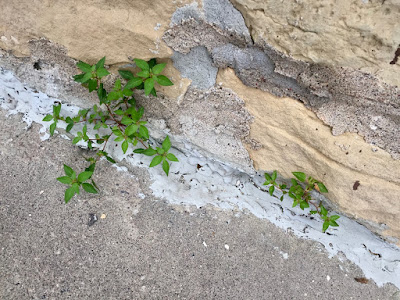 |
| what plant is this and how is it surviving?
Photo by J. Harrington
|
Can you identify any soil in the photo above? Anything one might normally consider a requirement for a seed to take hold, germinate and a plant to survive? We certainly couldn't. And, in fact, there were not one but three plants growing from the foundation of this building. Here's a view of two. The third is growing next to the grounding rod for the building.
 |
| and here's another surviving the same way
Photo by J. Harrington
|
We assume, based on the gray sealant, that the building's foundation is intended to be waterproof. We further assume that plant roots can create fissures in the sealant, grout and limestone(?) that comprises the foundation. These plants are growing but a narrow walkway away from a frequently mown lawn. We guess that whoever mows the lawn doesn't have a job description that also involves pulling plants (we don't know what they are) from the foundation.
So, we ask you, should those plants be allowed to stay? Should they be transplanted? Which of those options, or some other action, "tends to preserve the integrity, stability and beauty of the biotic community." How does one most appropriately integrate the law of unintended consequences with a Land Ethic? Perhaps it's once again time to reread A Sand County Almanac and then follow it with a rereading of Donella Meadows Dancing with Systems. But, perhaps we should defer until our current spell of hot, humid weather has ended. We seem to be even more prickly and nettlesome than usual. Then again, maybe it's the disgusting increase in political commercials we're being subjected to these days.
Darwin’s Bestiary
PROLOGUEAnimals tame and animals feralprowled the Dark Ages in search of a moral:the canine was Loyal, the lion was Virile,rabbits were Potent and gryphons were Sterile.Sloth, Envy, Gluttony, Pride—every perilwas fleshed into something phantasmic and rural,while Courage, Devotion, Thrift—every bright laurelcrowned a creature in some mythological mural.Scientists think there is something immoralin singular brutes having meat that is plural:beasts are mere beasts, just as flowers are floral.Yet between the lines there’s an implicit demurral;the habit stays with us, albeit it’s puerile:when Darwin saw squirrels, he saw more than Squirrel.1. THE ANTThe ant, Darwin reminded us,defies all simple-mindedness:Take nothing (says the ant) on faith,and never trust a simple truth.The PR men of bestiarieseulogized for centuriesthis busy little paragon,nature’s proletarian—but look here, Darwin said: some antsmake slaves of smaller ants, and endexploiting in their peonagesthe sweating brows of their tiny drudges.Thus the ant speaks out of bothsides of its mealy little mouth:its example is extolledto the workers of the world,but its habits also preachthe virtues of the idle rich.2. THE WORMEyeless in Gaza, earless in Britain,lower than a rattlesnake’s belly-button,deaf as a judge and dumb as an audit:nobody gave the worm much credittill Darwin looked a little closerat this spaghetti-torsoed loser.Look, he said, a worm can feeland taste and touch and learn and smell;and ounce for ounce, they’re tough as wrestlers,and love can turn them into hustlers,and as to work, their labors are mythic,small devotees of the Protestant Ethic:they’ll go anywhere, to mountains or grassland,south to the rain forests, north to Iceland,fifty thousand to every acreguzzling earth like a drunk on liquor,churning the soil and making it fertile,earning the thanks of every mortal:proud Homo sapiens,with legs and arms—his whole existence depends on worms.So, History, no longer letthe worm’s be an ignoble lotunwept, unhonored, and unsung.Moral: even a worm can turn.3. THE RABBITa. Except in distress, the rabbit is silent,but social as teacups: no hare is an island.(Moral:silence is golden—or anyway harmless;rabbits may run, but never for Congress.)b. When a rabbit gets miffed, he bounds in an orbit,kicking and scratching like—well, like a rabbit.(Moral:to thine own self be true—or as true as you can;a wolf in sheep’s clothing fleeces his skin.)c. He populates prairies and mountains and moors,but in Sweden the rabbit can’t live out of doors.(Moral:to know your own strength, take a tug at your shackles;to understand purity, ponder your freckles.)d. Survival developed these small furry tutors;the morals of rabbits outnumber their litters.(Conclusion:you needn’t be brainy, benign, or bizarreto be thought a great prophet. Endure. Just endure.)4. THE GOSSAMERSixty miles from land the gentle tradesthat silk the Yankee clippers to Cathaysift a million gossamers, like tidesof fluff above the menace of the sea.These tiny spiders spin their bits of webbingand ride the air as schooners ride the ocean;the Beagle trapped a thousand in its rigging,small aeronauts on some elusive mission.The Megatherium, done to extinctionby its own bigness, makes a counterpointto gossamers, who breathe us this small lesson:for survival, it’s the little things that count.
********************************************
Thanks for visiting. Come again when you can.
Please be kind to each other while you can.
No comments:
Post a Comment